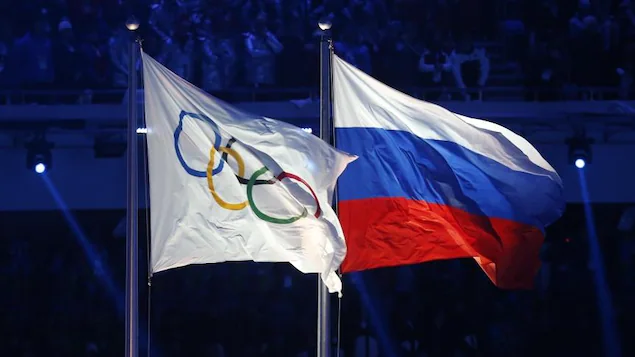One can believe this with the call made a few days ago by Oleg Matytsyn, during an interview with Russian sports daily newspapers. Sovetsky Sport And the Sport Express. Russian Sports Minister invited countries friends
Russia is in great competition.
Next July, we will organize the National University Games, Russian Universities. when talking about friendly countries
We can logically think of Belarus and China, or of former Soviet republics like Kazakhstan. This call by Russia appears to be a direct response to the sanctions imposed by the International Olympic Committee and the international federations.
However, Minister Matitsyn’s gesture is far from trivial when we revisit the history a bit. Radio Canada Sports spoke about it with Jean Levesque, a professor of history at the University of Quebec in Montreal.
In 1922, the Soviet Union placed sports at the center of communist thought. Then we want to appear a new Soviet man. In 1928, the Soviet Union wanted to distance itself from the Olympic movement, which was considered too bourgeois and capitalist, and created its own games, Spartakiads.
It is said that this name was chosen to remind the story of the famous slave Spartacus, who rebelled against the Roman Republic. At that time, we wanted to move away from bourgeois sports and above all talk about sports in terms of public health, explains Jan Levesque.
He explains that in 1924 we will create the Internationale du sport rouge to oppose capitalist sport, without bourgeois values. At the time, the Soviets were not really enthusiastic about the spirit of international competition. They are more in the spirit of public health by offering a healthy population model. So they will decide the competition between the “comrades”. This association with Red Sport International will allow for another model. So we will organize the first Spartakiads in Moscow, where communists of all countries will be able to participate.
So the invitation extended by the Russian Minister of Sports to the countries friends
Is it a response to the IOC and international federations? Yes and no, according to Jan Levesque.
In the medium or long term, the Russians will want to re-integrate into the global sports fold. But they are really communication specialists, and sometimes you have to read between the lines of the messages they want to send. I have the impression that the Russians may be preparing to create an alliance with the BRICS countries, Brazil, Russia, India, China and South Africa, to expel the CIO from the West’s monopoly on its decisions.
They will also try to influence the re-election of Thomas Bach who, until the invasion of Ukraine, was kind to the Russians, Mr. Levesque continues. So we could see a group of “friendly” countries that could stand up and change the rules of the major international sporting bodies. Imagine the power this bloc would have, with the Russians tied to the powerful Chinese, that could easily thwart the traditional influence of the West in the Olympic movement.
Join in France to Radio Canada Sports, lecturer at the University of Nantes Sylvain Dufres is also of this opinion.
He stressed that the message of the Russian Minister of Sports is a message to international bodies to inform them that the exclusion of Russians or their exclusion may lead to parallel organizations. We want, with this message, to press for negotiations with the IOC and international organizations so that they reconsider their decision.
For Sylvain Dufres, the call has been issued to friendly countries
Less reminiscent of the 1928 Spartakid than another major sporting event organized during the Los Angeles Games boycott of the 1980s.
In 1984, the Russians used the facilities of the 1980 Olympic Games in Moscow to organize the “Friendship Games,” he recalls. These games came in response to the lack of participation in the Los Angeles Games. Then we invited the allied nations — the German Democratic Republic, Czechoslovakia, Bulgaria, Hungary, Poland, and Vietnam — but we also gathered athletes from Afghanistan, Argentina, Algeria and even France.
Here, he adds, we see the same logical sequence. When the Russians face an obstacle to participation, we will rush to organize a parallel competition as the answer. Therefore, Russia is resuming the old position of the USSR. So we can see in Oleg Matissen’s gesture a desire to propose a new geography for the international sports world by relying on his allies.
” But the IOC does not like this kind of confrontation and has shown it throughout history. One of the great tactics of the IOC is to avoid any dissenting situation that could harm it. So we can expect a way out of the crisis and the IOC and the international federations finding a new compromise that will once again bring the world of sport together under a non-political banner. »
Russia appears unaware that it has been banned by the sports world and continues to act as if nothing had happened. It recently applied to organize the 2028 or 2032 European Football Championship. And as if that were not enough, it will also consider applying to host the 2029 or 2031 World Handball Championship, jointly with China.
If Russia no longer responds, it looks a lot like it.

“Hipster-friendly tv trailblazer. Problem solver. Infuriatingly humble introvert. Reader. Student. Subtly charming bacon maven.”






More Stories
Tour de France | Kevin Vauquelin wins stage 2, Hugo Holley finishes ninth
Daniel Briere breaks down in front of reporters
“In the sixth round, we were looking for a Quebecer, but he was selected.”